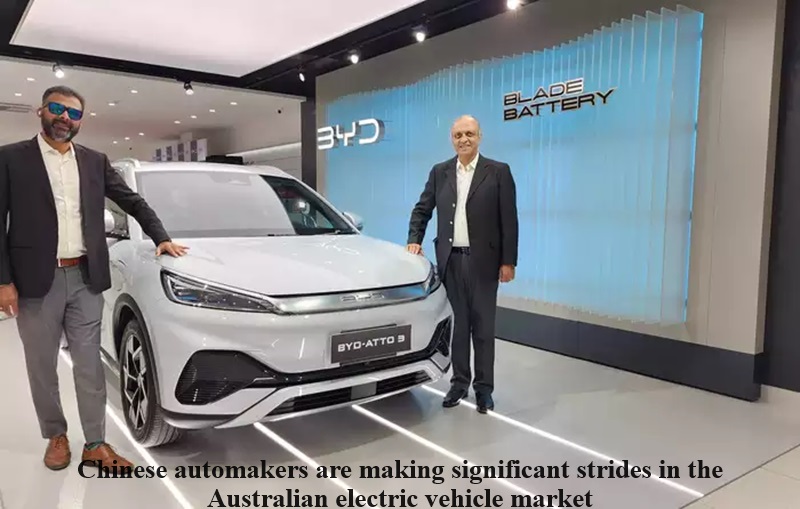
Chinese automakers, spearheaded by BYD, are making notable advancements in the Australian electric vehicle (EV) market, leveraging advantageous conditions such as government incentives and an increasing demand for eco-friendly transportation.
The Australian government, led by Prime Minister Anthony Albanese, has actively promoted EV adoption as part of its initiatives to reduce emissions, resulting in a surge in EV sales.
According to data from the Federal Chamber of Automotive Industries, EVs constituted 7.2 per cent of new car sales in Australia in 2023, a significant rise from 3.1 per cent the previous year.
David Smitherman, CEO of BYD’s distributor in Australia, underscored the burgeoning opportunities in the EV market, stating, “We need to now get into the mainstream market because we’ve sold to the early adopters and the passionate EV purchasers.”
BYD aims to diversify its product portfolio in Australia by introducing two SUVs and a pickup truck, seeking to deepen its market penetration.
Furthermore, the company is concentrating on fleet sales to enterprises like Uber and intends to expand its dealership network to accommodate escalating demand.
Chinese state-owned SAIC Motor is also poised to enhance its footprint in Australia with the debut of three new models under its MG brand, encompassing plug-in hybrids and electric roadsters.
This development reflects the broader trend of Chinese automakers investing in the Australian market, attracted by its absence of protectionist trade barriers and the government’s endorsement of EV adoption.
In contrast to tensions in other markets concerning Chinese EV makers’ access to state subsidies and cybersecurity apprehensions, the Australian government has not raised similar concerns.
In response to intensified competition, established automakers such as Ford and Toyota are also bolstering their presence in the EV sector.
Ford intends to introduce more electrified vehicles to the Australian market, while Toyota recently unveiled its inaugural electric car alongside its existing hybrid lineup.
Nevertheless, the emergence of Chinese EV manufacturers poses a notable challenge to traditional automakers, particularly those heavily reliant on gasoline-engine vehicles.
The Australian government has implemented diverse measures to incentivize EV adoption, including tax exemptions for EV purchases and substantial rebates at state levels.
These incentives have motivated consumers like Mark Adamson and Peter Alley to transition to electric vehicles.
Adamson, who benefited from significant discounts on his BYD Atto 3 SUV through government rebates and manufacturer discounts, expressed his rationale: “I figured why not give it a go? It’s sort of really worth doing.”
Alley emphasized the cost-saving advantages of EV ownership, especially amidst escalating gasoline prices.
BYD Commences Construction on EV Manufacturing Plant in Brazil
Meanwhile, BYD confirmed on Wednesday its commencement of construction on a manufacturing facility in Brazil.
This facility is scheduled to become operational either by the end of 2024 or in early 2025.
With an initial estimated annual production capacity of 150,000 units, the facility will prioritize the production of models such as the Dolphin hatchback, Dolphin Mini, Song Plus SUV, and Yuan Plus crossover during its initial phase.

Post Your Comments